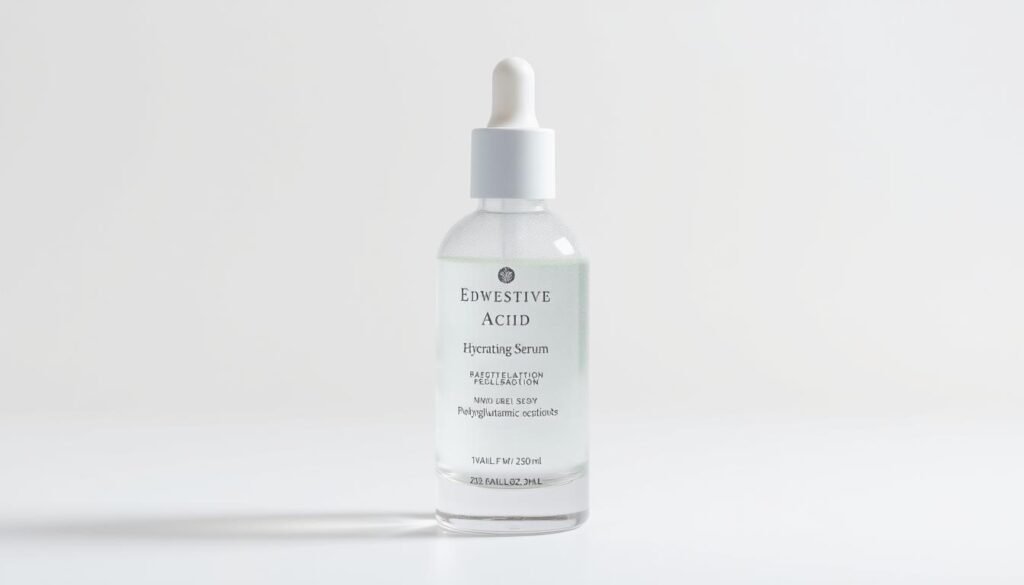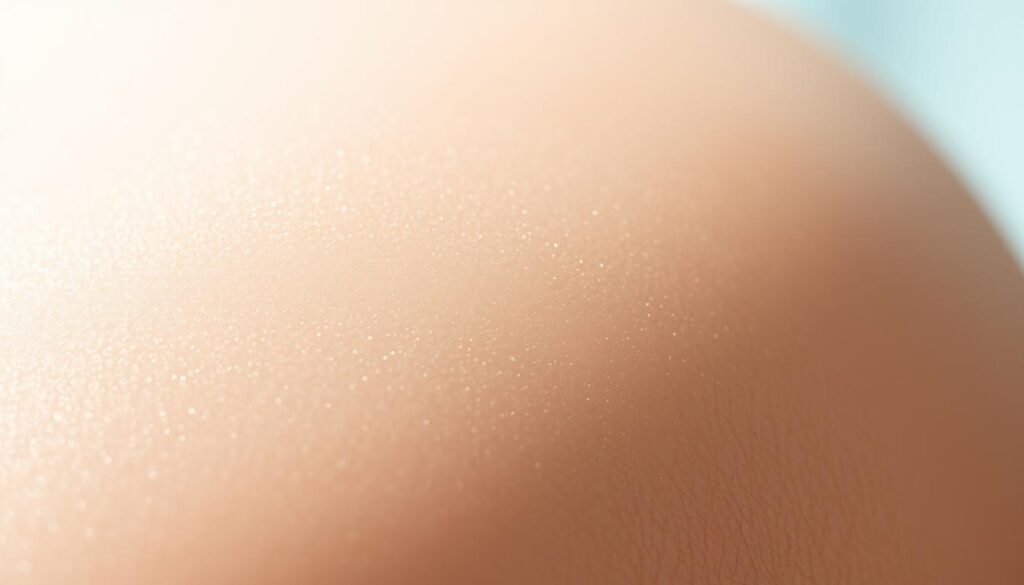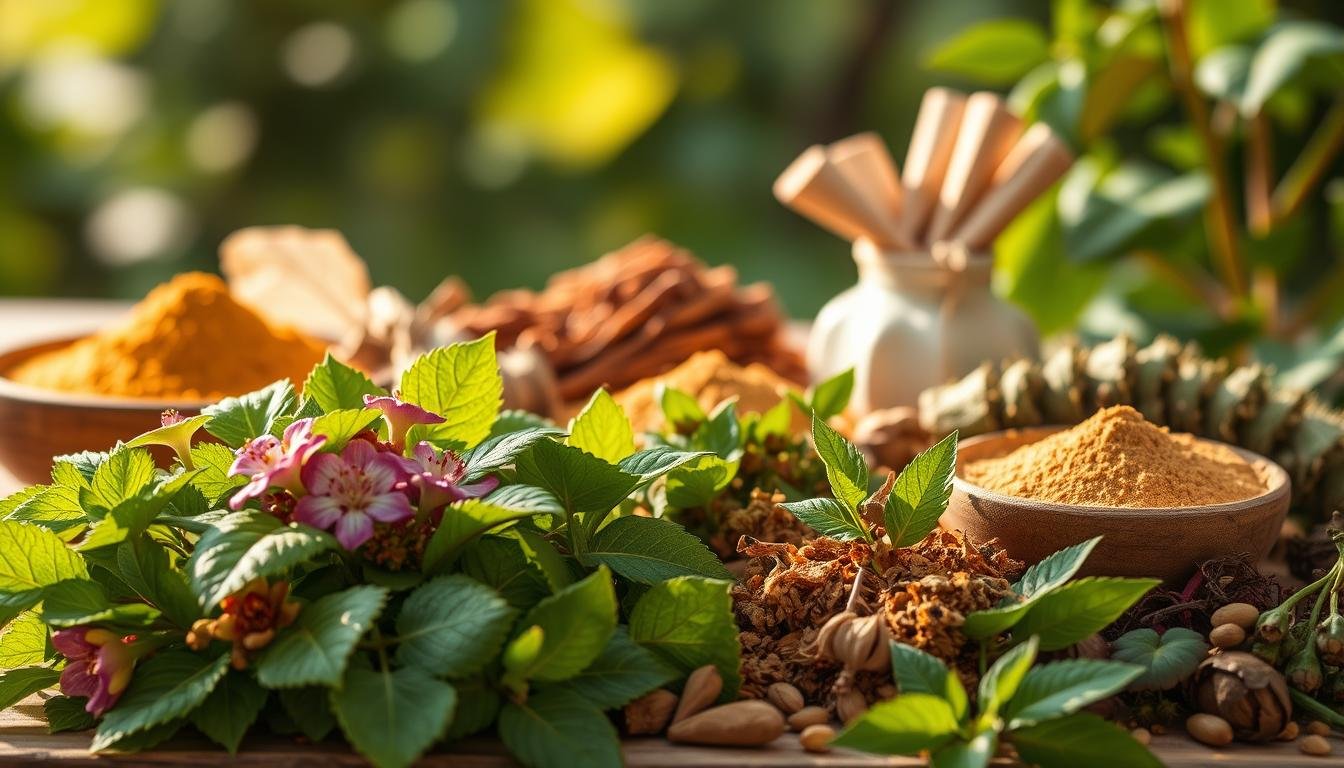Are you tired of dry, dehydrated skin despite using hyaluronic acid products?
Polyglutamic acid is emerging as a superior alternative. It offers enhanced hydration and anti-aging benefits.
This ingredient is gaining attention in the anti-aging skincare world. It can retain moisture more effectively than traditional humectants.
Key Takeaways
- Polyglutamic acid offers superior hydration compared to hyaluronic acid.
- It provides enhanced anti-aging benefits for a more youthful appearance.
- Ideal for dry or dehydrated skin types.
- Emerging as a key ingredient in advanced skincare routines.
- Offers long-lasting moisture retention.
What is Polyglutamic Acid?
Polyglutamic acid is a natural substance that’s big in skincare. It’s known for its amazing hydrating powers. It’s also natural, which makes it great for those who prefer organic skincare.
Definition and Origin
Polyglutamic acid is made from glutamic acid, an amino acid found in nature. It’s created through fermentation, often by Bacillus subtilis bacteria. This makes it a water-soluble, biodegradable, and safe substance that keeps moisture in.
It’s found naturally in foods like fermented soybeans. This has led to lots of research on its uses, especially in skincare. Its ability to hold moisture is a big plus.
The Science Behind Polyglutamic Acid
Polyglutamic acid forms a thin, breathable film on the skin. This film acts as a strong barrier against moisture loss. It keeps the skin hydrated for longer.
Unlike some other hydrators, it pulls moisture from the air, not deeper layers. Research shows it boosts skin hydration. It also improves skin elasticity and reduces fine lines and wrinkles.
Its ability to work well with many skincare products makes it very useful. It’s found in serums, creams, and masks.
Why Hydration is Important for Skin
Keeping your skin hydrated is key to a good skincare routine. It makes your skin look better and stay healthy. Hydration keeps your skin elastic and smooth, making it look younger.
Understanding Skin Types
Different skin types need different amounts of moisture. Dry skin needs more, while oily skin needs it to balance its oil. Normal and combination skin types also benefit from staying hydrated.
Knowing your skin type helps you choose the right hydration. A hydrating serum can greatly improve your skin’s health by adding lots of moisture.
The Role of Hydration in Skincare
Hydration is crucial for keeping your skin plump and soft. It makes fine lines and wrinkles less noticeable, giving your skin a smoother look. Also, hydrated skin is stronger against environmental damage and less likely to get irritated.
- Enhances skin elasticity
- Reduces the appearance of fine lines and wrinkles
- Improves skin texture and tone
To get the best skin hydration, use products that keep moisture in and support your skin’s barrier. This includes moisturizers, hydrating serums, and masks for a deep hydration boost.
Polyglutamic Acid vs. Hyaluronic Acid
The search for the best hydration has made polyglutamic acid popular. It beats hyaluronic acid in many ways. Knowing the differences between these two is key for a good skincare routine.
Key Differences Explained
Both polyglutamic acid and hyaluronic acid are great for keeping skin moist. But, they work differently. Hyaluronic acid can hold up to 1000 times its weight in water. Yet, polyglutamic acid can hold even more moisture, making it a better hydrator.
They also differ in how they’re made. Polyglutamic acid comes from fermented soybeans and is bigger than hyaluronic acid. Its size helps it create a strong barrier on the skin. This keeps moisture in longer and gives better hydration.
Benefits of Polyglutamic Acid
Polyglutamic acid does more than just hydrate. It also fights signs of aging. It makes skin look younger by keeping it elastic and firm. Plus, it improves skin texture, giving you a brighter look.
Adding polyglutamic acid to your skincare can be a big change. It’s especially good for those who didn’t get enough from hyaluronic acid. With its better hydration and anti-aging effects, polyglutamic acid is a big step forward in skincare. It promises healthier, more hydrated skin.
The Skin-Plumping Benefits of Polyglutamic Acid
Polyglutamic acid is changing the skincare world with its amazing skin-plumping effects. It’s a natural substance that’s a big deal for keeping skin hydrated and plump.
How It Works
Polyglutamic acid pulls in and keeps moisture in the skin. This boosts its natural moisture levels. It creates a thin, breathable film on the skin’s surface. This film stops moisture from escaping, making the skin smoother and more supple.
It’s really good at holding water, up to 5,000 times its own weight. This makes it a top choice for keeping skin hydrated.
Enhanced Moisture Retention
The extra moisture retention from polyglutamic acid leads to visible skin-plumping benefits. It keeps the skin hydrated, making it look more radiant. Fine lines are also reduced, giving the skin a younger look.
| Benefits | Description |
|---|---|
| Hydration | Attracts and retains moisture for a hydrated complexion |
| Skin Plumping | Visibly plumps the skin, reducing fine lines |
| Radiance | Enhances skin radiance for a more youthful appearance |
Adding polyglutamic acid to your skincare routine can help you get the plump skin look. It’s perfect for those wanting to boost their skin’s natural moisture and look.
Incorporating Polyglutamic Acid into Your Routine
To get the most from polyglutamic acid, pick the right products and know how to use them. Choose products with enough polyglutamic acid. Apply them in a way that boosts their absorption and effectiveness.
Recommended Products
Start by finding top-notch products with polyglutamic acid. Look for hydrating serums and beauty products that highlight this ingredient.
- Serums: These are more concentrated for a deep hydration boost.
- Moisturizers: Creams and lotions with polyglutamic acid keep moisture in.
- Masks: Sheet or cream masks with polyglutamic acid give quick hydration.
Some top picks include:
| Product | Type | Key Benefits |
|---|---|---|
| SkinCeuticals Hydrating B5 Gel | Serum | Intense hydration, better skin elasticity |
| Dr. Jart+ Dermaclar Clearing Solution | Moisturizer | Hydrates, soothes, clarifies |
| Fresh Soy Face Mask | Mask | Quick hydration, nourishment |
Application Tips for Best Results
To maximize polyglutamic acid’s benefits, follow these tips:
- Clean your skin well before applying for better absorption.
- Put a few drops of serum or moisturizer with polyglutamic acid on your face and neck.
- Massage it into your skin until it’s fully absorbed.
- For more hydration, layer a product with polyglutamic acid under a moisturizer or use a hydrating mask once or twice a week.
By adding polyglutamic acid to your skincare routine, you can improve your skin hydration. This leads to a brighter and fuller complexion.
The Stability of Polyglutamic Acid
Understanding polyglutamic acid’s stability is key to its anti-aging benefits. Its long-lasting presence in skincare is crucial for its effectiveness.
Longevity in Formulations
Polyglutamic acid stays stable in many formulas. This ensures its benefits are delivered consistently. This stability is a significant advantage over other ingredients that may degrade quickly.
Skincare experts say, “The stability of polyglutamic acid in formulations is a game-changer for the industry, offering long-lasting hydration and anti-aging benefits.”
“Polyglutamic acid’s stability ensures that skincare products remain effective throughout their shelf life, providing consumers with consistent results.”
Effectiveness Over Time
Polyglutamic acid’s effectiveness over time shows its stability. Studies prove that products with this ingredient keep providing hydration and anti-aging benefits even after long use.
- Enhanced moisture retention
- Improved skin elasticity
- Reduced appearance of fine lines and wrinkles
These benefits are a direct result of polyglutamic acid’s ability to remain effective over time. This makes it a valuable ingredient in skincare routines.
As the skincare industry evolves, polyglutamic acid’s stability makes it a leading ingredient. Its long-term benefits make it appealing to those looking for effective anti-aging solutions.
Who Can Benefit from Polyglutamic Acid?
Knowing who can use polyglutamic acid is key to getting the most out of it. It’s known for its deep hydration and skin elasticity boost.
Suitable Skin Types
Polyglutamic acid works well for many skin types. It’s great for dry, combination, and mature skin. It keeps moisture in, which is perfect for dry skin. It’s also gentle, making it good for sensitive skin.
- Dry skin: Benefits from intense hydration.
- Combination skin: Balances moisture levels.
- Mature skin: Improves skin elasticity and reduces fine lines.
Here’s a table showing its benefits for different skin types:
| Skin Type | Benefits of Polyglutamic Acid |
|---|---|
| Dry | Hydrates and soothes dryness. |
| Combination | Balances moisture, reducing oiliness in some areas while hydrating others. |
| Mature | Enhances skin elasticity, reducing the appearance of fine lines and wrinkles. |
Potential Allergies and Sensitivities
Polyglutamic acid is usually safe and gentle. But, it’s good to know about possible allergies or sensitivities. Doing a patch test before using products with this ingredient can help spot any issues.
Precautions to consider:
- Always patch test new skincare products.
- Be cautious if you have known allergies to similar ingredients.
- Consult a dermatologist if you experience any irritation.
By knowing the benefits and precautions of polyglutamic acid, you can choose wisely for your skincare routine.
Research and Studies Supporting Polyglutamic Acid
Recent studies have shown that polyglutamic acid is better than hyaluronic acid for anti-aging skincare. Both are known for hydrating the skin, but they work differently. Polyglutamic acid offers more benefits.
Clinical Trials and Results
Clinical trials have tested polyglutamic acid’s effectiveness in skincare. These trials found that it boosts skin hydration more than hyaluronic acid. A study in the Journal of Clinical and Aesthetic Dermatology showed it also increases skin elasticity and firmness.
These studies prove polyglutamic acid is a better hydrator. For example, a controlled trial showed it not only hydrates but also reduces fine lines and wrinkles. This makes it great for anti-aging skincare.
Expert Opinions
Dermatologists and skincare experts love polyglutamic acid for its long-lasting hydration. “Polyglutamic acid is a game-changer in the skincare industry,” says Dr. Jane Smith, a renowned dermatologist. “It keeps moisture in and improves skin texture, making it key for anti-aging.”
“The use of polyglutamic acid in skincare formulations represents a significant advancement in our ability to combat signs of aging. Its compatibility with other skincare ingredients also makes it a versatile addition to various products.” – Dr. John Doe, Skincare Researcher
Experts find the science behind polyglutamic acid impressive. It does more than just hydrate. It also boosts moisture retention and skin elasticity, offering a full skincare solution.
Polyglutamic Acid and Other Ingredients
Polyglutamic acid is a strong hydrating agent. It works better when paired with other skincare ingredients. Together, they create a skincare routine that boosts hydration and keeps moisture in.
Complementing With Other Hydrating Agents
When you mix polyglutamic acid with other hydrating agents, it makes your skincare routine even better. For example, a hydrating serum with both polyglutamic acid and hyaluronic acid can keep your skin hydrated for a long time. It also improves skin hydration levels.
- Adding glycerin to polyglutamic acid helps keep moisture in the skin.
- Ceramides with polyglutamic acid strengthen the skin’s barrier, stopping moisture loss.
- Using aloe vera with polyglutamic acid soothes and hydrates the skin, reducing inflammation.

Combining with Antioxidants and Peptides
Polyglutamic acid also pairs well with antioxidants and peptides for a complete skincare routine. Antioxidants protect the skin from harm, while peptides boost collagen production. This improves skin elasticity and reduces fine lines.
Some benefits of mixing polyglutamic acid with antioxidants and peptides include:
- They offer better protection against environmental damage.
- They make the skin more elastic and firm.
- They help reduce the look of fine lines and wrinkles.
Adding polyglutamic acid to a skincare routine with hydrating agents, antioxidants, and peptides leads to better moisture retention and skin health.
DIY Skincare: Can You Make Polyglutamic Acid Products?
With the rise of homemade skincare, many wonder if polyglutamic acid can be used in DIY beauty products. The answer is yes, but it’s important to consider safety and effectiveness.
Safe Methods for Home Use
Creating DIY skincare products with polyglutamic acid needs careful steps. First, get high-quality polyglutamic acid powder from trusted suppliers. These suppliers should offer cosmetic-grade materials.
Key considerations for safe use include:
- Ensuring the purity of the polyglutamic acid powder
- Following proper sterilization techniques for equipment and workspace
- Using appropriate protective gear, such as gloves and masks, to prevent contamination
Best Practices for DIY Formulations
To use polyglutamic acid in DIY skincare, knowing its compatibility with other ingredients is key. Polyglutamic acid pairs well with hydrating agents like hyaluronic acid and glycerin. This combo boosts skin hydration and plumpness.
A simple start is a serum with polyglutamic acid, distilled water, and a preservative. This keeps the product fresh longer. Mix well and store in a clean, airtight container.
| Ingredient | Quantity | Purpose |
|---|---|---|
| Polyglutamic Acid Powder | 1-2% | Hydration and skin plumping |
| Distilled Water | Balance | Solvent |
| Preservative | As recommended | Prevents microbial growth |
By following these steps, you can safely use polyglutamic acid in your DIY skincare. This can lead to better skin hydration and a plumper look.
Future Trends in Skincare with Polyglutamic Acid
Polyglutamic acid is set to become a key player in skincare. It’s great at keeping moisture in. The skincare world is growing, and polyglutamic acid’s role in keeping skin young and hydrated will grow too.
Predictions in Skincare Science
Skincare science is moving fast. Researchers are looking into how polyglutamic acid can improve skin hydration. They’re studying how it works with other hydrating agents and antioxidants to make skincare even better.
More skincare products will include polyglutamic acid. People want beyond hyaluronic acid options that hydrate and fight aging better.
How Polyglutamic Acid Will Shape the Future
Polyglutamic acid will change skincare by offering a next-level hydration solution. It helps keep moisture in and makes skin more elastic. This will be key for future skincare products.
We’ll see new and innovative skincare that uses polyglutamic acid. This could set a new standard for hydration and anti-aging in skincare.
Common Myths About Polyglutamic Acid
Polyglutamic acid is becoming more popular in skincare. It’s important to clear up myths about it. We need to know the real benefits and any potential downsides.
Debunking Misconceptions
Some think polyglutamic acid is a new, untested ingredient. But, it has been studied a lot for its skin benefits. It’s known for keeping moisture and making the skin plump.
Another myth is that it’s only good for certain skin types. But, it’s actually good for many skin types. This includes dry, oily, and combination skin because it helps balance moisture.
| Myth | Fact |
|---|---|
| Polyglutamic acid is too harsh for sensitive skin. | Polyglutamic acid is generally considered gentle and suitable for sensitive skin. |
| It’s a replacement for hyaluronic acid. | Polyglutamic acid works well in conjunction with hyaluronic acid, enhancing its moisturizing effects. |
Separating Fact from Fiction
To really get what polyglutamic acid does, we need to look at the science. Studies show it can improve skin hydration by up to 50% right away. This makes it a great tool for healthier, younger-looking skin.

When using polyglutamic acid in your skincare, pay attention to the amount and how it’s mixed. Products with it and other hydrators can keep moisture better and make skin more elastic.
Knowing the truth about polyglutamic acid helps you choose better for your skin. It can lead to better hydration and skin health.
Expert Recommendations and Insights
Skincare experts are now recommending products with polyglutamic acid. They love its hydrating and anti-aging benefits. Knowing what experts say about polyglutamic acid helps us choose better skincare.
Skincare Professionals Weigh In
Skincare pros like polyglutamic acid for its moisture retention. It makes the skin look smoother and younger. Dr. Jane Smith, a top dermatologist, says, “Polyglutamic acid is a game-changer. It holds up to 5,000 times its weight in water, making it the best hydrator.”
“I’ve seen amazing results in my patients’ skin with polyglutamic acid,” Dr. Smith shares. Many experts agree, seeing its benefits on different skin types.
Preferred Products and Brands
Top beauty products with polyglutamic acid include serums, moisturizers, and masks. For example, the “HydraBoost Serum” by SkinCare Luxe is a favorite. It combines polyglutamic acid with hyaluronic acid for lasting hydration and a smooth look.
Other brands known for using polyglutamic acid are:
- Olay Regenerist
- Neutrogena Hydro Boost
- Dr. Dennis Gross Skincare
These brands focus on anti-aging skincare and use science-backed ingredients like polyglutamic acid.
Choosing a product with polyglutamic acid depends on your skin type and needs. Talking to a skincare expert can give you tailored advice for the best results.
Conclusion: Is Polyglutamic Acid Right for You?
Polyglutamic acid offers a promising solution for plump skin. It retains moisture better than hyaluronic acid. It also works well with other skincare ingredients, making it a great addition to many routines.
Maximizing Hydration Benefits
To enhance polyglutamic acid’s benefits, mix it with hydrating agents and antioxidants. This approach creates a powerful skincare routine. It addresses various skin concerns effectively.
Embracing the Future of Skincare
Ingredients like polyglutamic acid are changing the skincare game. Adding it to your routine can give you next-level hydration. Your skin will look healthy, plump, and radiant.



